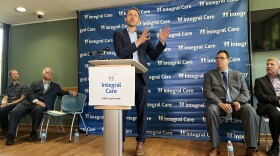A local public health provider is helping homeless people stay out of the emergency room by connecting them to long-term health care.
Central Health, Travis County's public hospital district, runs its new bridge program out of the organization’s Capital Plaza clinic, located off I-35 near Windsor Park. There, unhoused people can get care for acute issues like wounds, allergies or illness, or be seen for chronic concerns, like breathing issues or mental illnesses.
Dr. Tim Mercer, Central Health’s director of high-risk populations, said people living on the street often call 911 when they have health needs and are taken to the emergency room.
“A lot of these calls are coming from people on the street … who really don’t need the ER in terms of an acute emergency,” Mercer said. “It’s that they've run out of their medicines, or they have a chronic wound, or they were seen in the ER and told to follow up with a specialist, but don't really know how to get there.”
Now, Austin-Travis County Emergency Medical Services has the option to bring some of those patients to the Capital Plaza clinic, entering through a private side door. Central Health and EMS began the partnership in September.
“Having the ability to navigate people to that clinic has opened up a lot of opportunities to help those patients — additional care, wraparound services, things that simply don’t happen in an emergency room,” EMS Division Chief Angela Carr said in a news release.
Bridge clinic staff treat patients’ acute needs, like wound care and over-the-counter pain management, but they also help patients get tied into programs to manage their health long-term. Sometimes that means helping patients enroll in Central Health’s Medical Access Program (MAP), which provides health coverage to low-income Travis County residents who do not qualify for Medicaid. It can also mean helping patients establish care with primary physicians and specialists.
Mercer said all of this can take a lot of time and might require multiple visits, which traditional doctor’s offices might not have the capacity for.
“I saw a guy last week, and I’m seeing him next week and probably the week after to get him stabilized, which isn’t common in typical primary care,” he said.

That patient, Mercer said, is a former MAP member whose coverage had lapsed. He has been couch-surfing with family members and had run out of prescriptions to help manage multiple complex conditions. After several hospitalizations and ER visits, EMS brought him to the bridge clinic.
“On the spot, we got him connected with MAP,” Mercer said. “I was able to assess his needs, refill his critical meds, do his labs, help him get connected for food stamps and other benefits.”
Since then, Mercer has followed up to help the patient straighten out issues accessing his medications and get him referred to a mental health counselor and other specialists.
As of January, the bridge program is bringing these services to shelters and other locations around the city via a new mobile unit. So far, the mobile team has treated patients at Austin’s Eight Street Shelter for Women and has a visit planned to Integral Care’s new mental health diversion center, a program that provides an alternative to jail for people with mental illnesses.
“We know there's a huge unmet need in our community of people disconnected from care, and we just wanted to try to fill those gaps as much as we can,” Mercer said.








